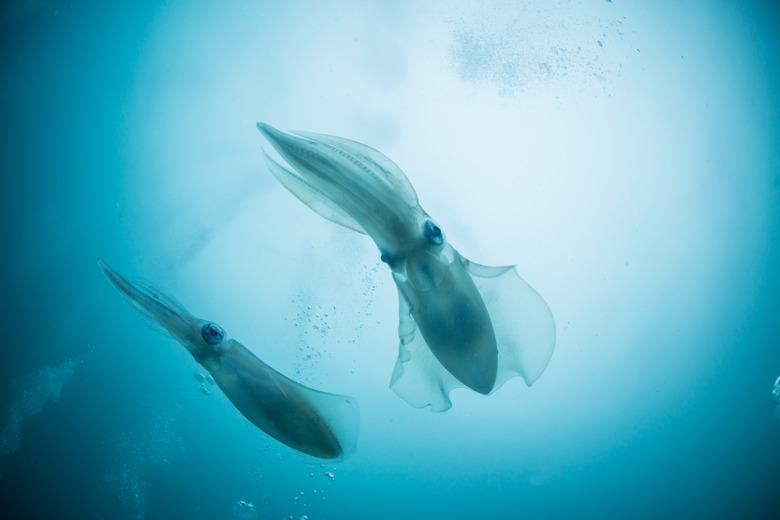Life Cycle Of A Squid
Squids belong to a group of mollusks called cephalopods of the order Teuthida, which includes about 800 species. Cephalopods appeared on Earth several million years before primitive fish, and despite their short life spans, they have a thriving population.
Squids Have Arms and Tentacles
Squids Have Arms and Tentacles
Like all cephalopods, a squid's body features a distinct head, and the right side of its body mirrors the left half, a feature scientists call bilateral symmetry. All squids have a mantle or a soft exterior membrane that encloses the gills, and arms and tentacles. Squids have short life spans and teuthologists–the marine biologists who study them–are still learning about their life cycles, focusing especially on the giant Humboldt and colossal squids.
Weeds of the Seas
Weeds of the Seas
Squids usually live from three to five years. Scientists call this quick life history "r-selection," with the r signifying extreme reproduction and growth. In life history terms, cephalopods are the weeds of the seas and they have the potential to out-reproduce fish and mammal populations. Despite overfishing and climate change, there may be more squids now than any time in history.
11 Pounds of Eggs
11 Pounds of Eggs
Male squids store packets of sperm called spermatophores in specialized long arms, which penetrate the female's mantel during a mating session that lasts just 15 seconds. Squids usually spawn in groups and females release up to 11 pounds of eggs. Most squids lay their eggs in masses on the sea floor, but some carry a clutch of eggs in their arms to guard them. Adult squids don't live long after mating.
Baby Stages
Baby Stages
Baby squids hatch as larvae and grow into maturity in about three to five years. Marine biologists believe that short finned squids don't live any longer than 12-18 months. Spawning females release about 100,000 eggs, and most hatch in about two weeks. The hatchlings progress first to the larval, next to the juvenile and then to the squid stage.
Water Quality
Water Quality
Squid species are common all over the world in such numbers that there is a thriving squid fishing industry. Squid numbers are a good indicator of water quality, because squids leave polluted water to congregate in cleaner water. Their abundant numbers are also important to the balance of the ecosystem, since predators like sperm whales, sea birds and seals depend on them for food.
Population Explosion
Population Explosion
Squid populations seem to be increasing with global warming, and marine research suggests that the total body mass of squids on Earth far exceeds the mass of humans. Some marine biologists predict that rising global temperatures will speed up metabolism and growth in cephalopods, producing a squid population explosion.
Cite This Article
MLA
Writer, Contributing. "Life Cycle Of A Squid" sciencing.com, https://www.sciencing.com/life-cycle-squid-5813188/. 22 November 2019.
APA
Writer, Contributing. (2019, November 22). Life Cycle Of A Squid. sciencing.com. Retrieved from https://www.sciencing.com/life-cycle-squid-5813188/
Chicago
Writer, Contributing. Life Cycle Of A Squid last modified March 24, 2022. https://www.sciencing.com/life-cycle-squid-5813188/
